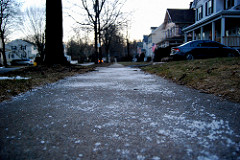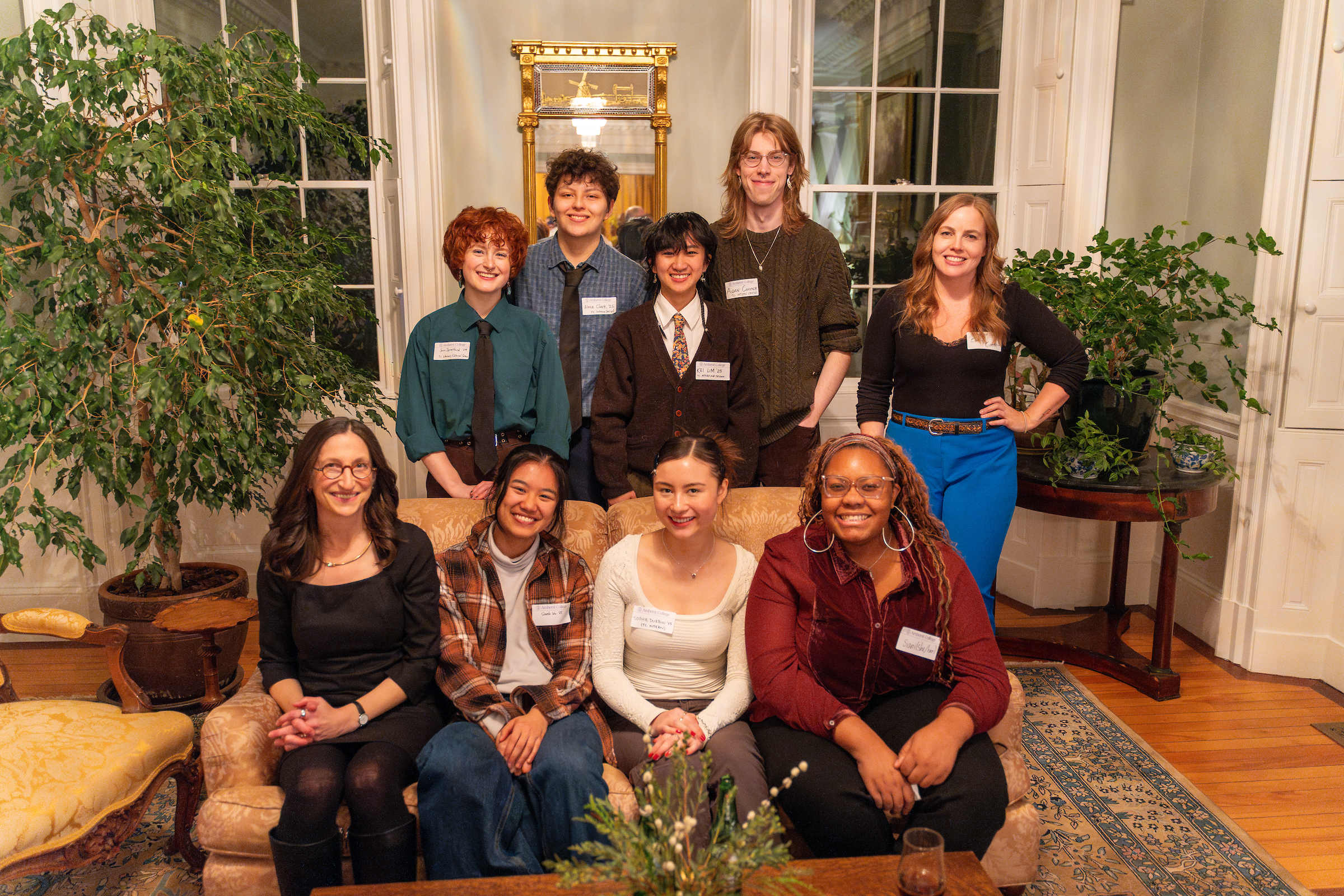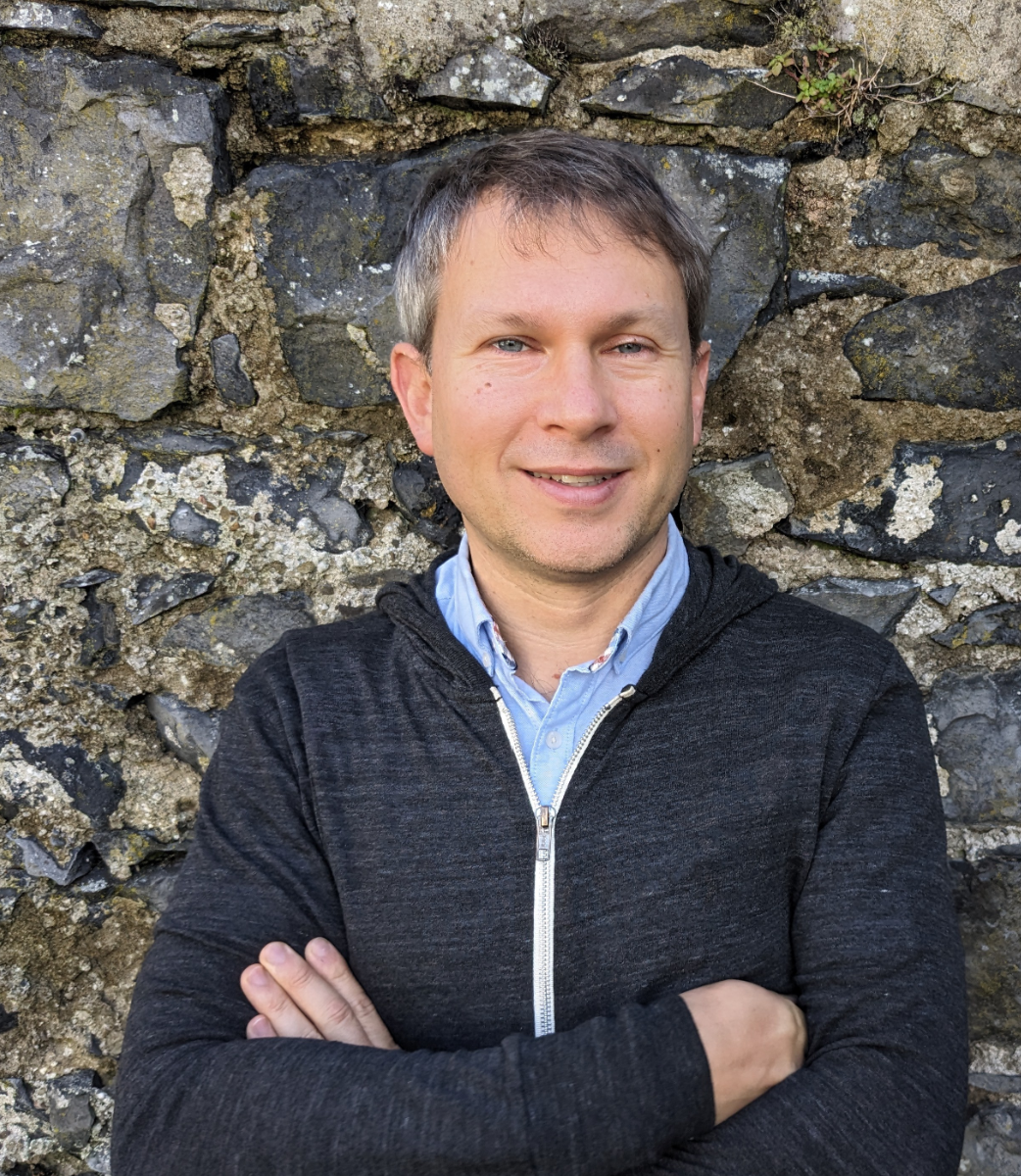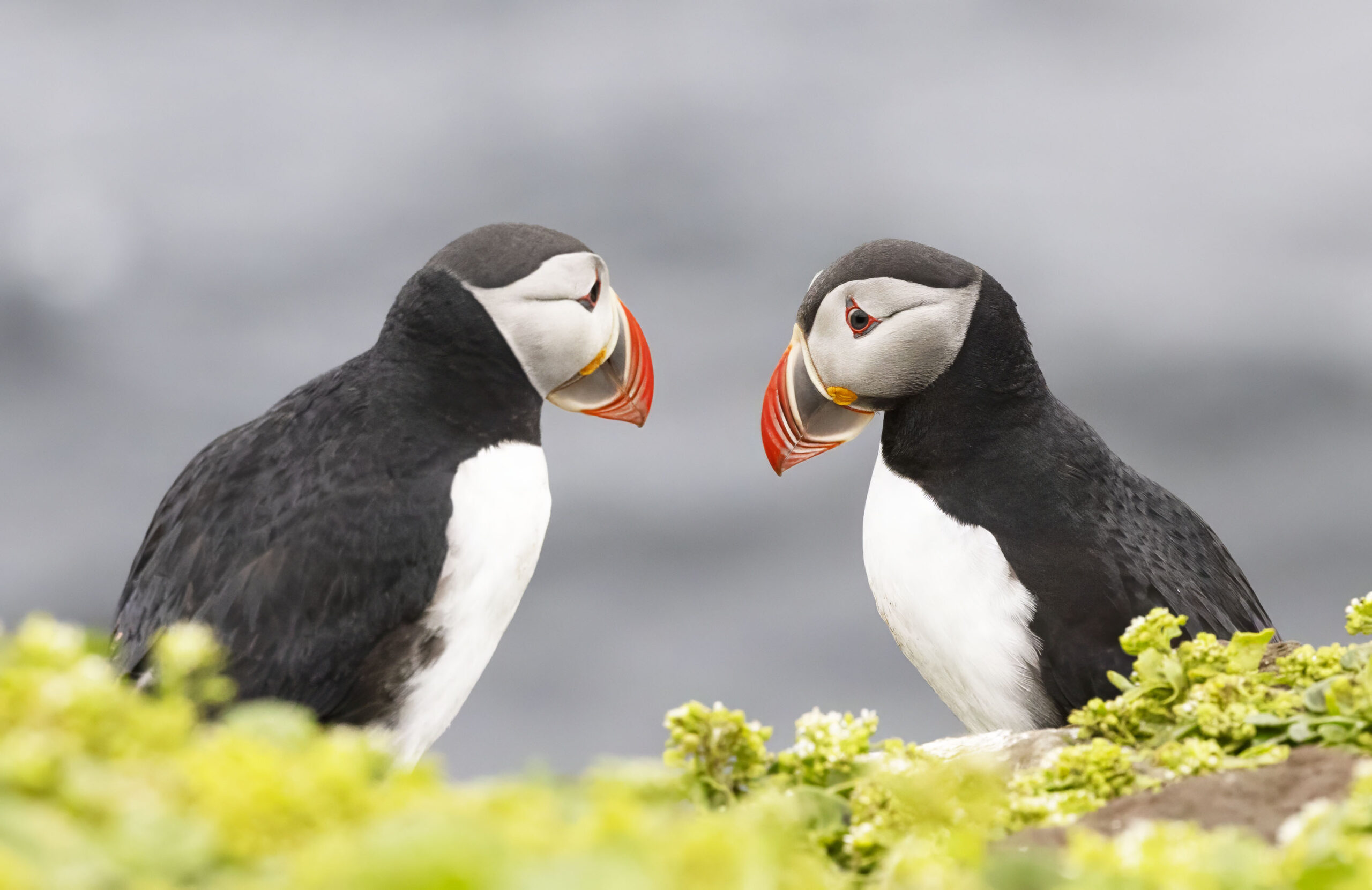1.
The sidewalk in front of my house unfurls enticingly to the north and south. Though its seams have buckled after months of gravel and salt, the walk still leads me to my neighbor’s porch, where I pull eggs and goat cheese from the fridge, take honey from the shelf, and leave cash in an unlocked box. The snow- and ice-narrowed path also still ferries a friend and me to the Bookmill, where we drink wine in the afternoon and squeeze up tight next to the stacks to peer down on the rushing creek below. If the walk’s covered overnight by a hard snow, Don blasts his snowblower through, the cranking assault of the motor a reasonable price to pay for the favor. For the magic of having one’s way into the world restored. That I have a sidewalk outside my door is a fairy-tale luxury, an enchantment.
I grew up in a land without such connective arteries. Our rural roads first served horses and oxen, then tractors and cars. Pedestrians were ignored with good reason: given an automotive alternative, I was not going to walk to school through five miles of Maine winter. I loved living in the wooden home my parents built, all jerry-rigged door handles and loft beds accessed by ladders raised and lowered by pulleys. The quilted squares of my father’s garden and orchards—asparagus, potatoes, and herbs all in their own patches; blueberries on two separate fields—led to brambled woods, which led to a swamp maintained by a beaver. I played for hours under the wonderfully low and protective shelter of pine limbs. But there was no place to go. You were either home or far away from home, and you took a car to get there.
So I appreciate my Montague sidewalk, always here and taking no forethought other than the right footwear (this winter: many days of rubber boots strapped with metal spikes). No matter the weather, my mood, available companionship or vehicle, I can always leave. Leave the indoor air for trees, for flower beds and dogs, for the stunning morphing ice sheets. I have not tired of where I can get on foot: a circle over ground whose familiarity settles my feet and heart as it uncages my mind. How satisfying the possibility of a wandering loop—so much more promising than that tired out-and-back of retracing steps.
2.
In the fairy tales that imbue so many of our childhoods, those who need rescue—the tower-trapped, the spellbound—are isolated in body or spirit. The heroes, too, start out alone, and from a remote hut or distant mountaintop, they are drawn, by the quest, into touch with travelers, disguised beggars, simpletons, evil queens, and dragons. With them we tramp mossy paths through charmed forests and scale castle walls to slay enemies with magic stones and incantations. Through their journey, from beginning to The End, virtue is strengthened, or shown to be an illusion. And this simple inevitability is the appeal, satisfying our desires: to make a difference, to be loved, to end days of struggle. They are stories that exert even more power when we too are mired, gloomy, disconnected—whoever read a fairy tale on an exuberant, sunny day?
But fairy tales don’t take me anywhere. For all the wonder and high stakes, they rarely pull me in for longer than an opening line or two—long enough to learn the premise and chart how good will be satisfyingly restored. Fairy tales, which are essentially without place and time, are so encapsulated: there’s a carriage ready to cart me away, but no view outside the window and no traveled road extending behind. It’s the transformation narrative that takes priority. Unlike myth and legend, fairy tales are not tied to history; they are not origin stories. In fact, fairy tales often disappear the past: what we become is all that matters.
Between the why and the what if, I always choose the former. For me, the deep saturation of the past creates a most powerful undertow. The past is a beguiling place accessible to all of us, and yet there is an urgency to our visits because we know that, unlike the land of fairy tales, this place cannot be relied upon to endure over time. It is likely to change under our close scrutiny.
3.
In the hard center of this persistent winter, I was slingshot back to Abu Dhabi for a few days. Because our friends there have moved to a new part of the city, close to the university’s uprising new campus, we recrossed very few of the paths we’d worn during our year there. Instead of returning to the downtown of chocky high-rises and superblocks, we stayed at a hotel on a stretch of beach. I’d never lived in this area of the city, and now I was a guest of the country, not a resident. Any tenuous claim I might have had on this place had largely slipped away.
Several mornings, a friend and I set off along the sand, leaving phones and keys on the vacant beach chairs (too windy and cold for sunbathing) under the watchful eyes of the South Indian and Filipino lifeguards. We rolled up our pants and sleeves and kicked the broken shells behind us, the city center miles to our backs. I asked a lot of landmark questions. Up ahead? The Monte Carlo. Behind, the new campus of a British private school. Over there, yet another resort. The dolphins I’d seen swimming along this coast when we lived here were nowhere during these January days. The lifeguards said the construction noise was keeping them away.
I had a short time to enjoy this shifted version of my past, not only because I had a return flight in seven days, but also because soon this landscape would be unrecognizable. The concrete would smother the sand, the horizon-hovering cranes would be replaced by glass-and-metal silos, the mixed-income housing and shops among the mosques downtown taken over by car parks to access the expanding (and attractive) central market. To walk here, during this trip, was to be ghostly, touching both past and future but firmly set in neither.
4.
No one captures the poignancy of the searching walk, the elusive past, as beautifully as Virginia Woolf as she haunts London’s streets for a lead pencil on a winter evening. As she leaves her house, the lamps begin to light, and the streets are “at once revealed and obscured,” filled with men and women who “wear a certain look of unreality, an air of triumph, as if they had given life the slip.”
Woolf’s eye is “an oyster of perceptiveness” that pulls us steadily deeper into a stream of alternately dark and glowing images. She encounters, in a shoe store, a dwarf showing off perfectly shaped, average-sized feet, a woman whose departure for the intolerant street dramatically bleakens the mood and reveals to Woolf a city of grotesques. But then, a recovery, and Woolf imagines herself at two a.m. on a Mayfair balcony wearing the most elegant pearls.
But before we return home with the sought-after item in hand, Woolf catches us out as seekers of a certain desperation. There is something we want most of all, though it takes an hour of walking to admit it. At last we see “the whole breadth of the river Thames—wide, mournful, peaceful. And we see it through the eyes of somebody who is leaning over the Embankment on a summer evening, without a care in the world.” Woolf urges us to stray from our purpose:
Let us put off buying the pencil; let us go in search of this person—and soon it becomes apparent that this person is ourselves. For if we could stand there as we stood there six months ago, should we not be again as we were then—calm, aloof, content? Let us try then. But the river is rougher and greyer than we remembered. The tide is running out to sea…. The sights we see and the sounds we hear now have none of the quality of the past; nor have we any share in the serenity of the person who, six months ago, stood precisely where we stand now. His is the happiness of death; ours the insecurity of life. He has no future; the future is even now invading our peace. It is only when we look at the past and take from it the element of uncertainty that we can enjoy perfect peace.
Reading this, I realize that resolving such uncertainty is where fairy tales excel: Poof! But such instantaneous transformation leaves me feeling more unmoored than when I started. No amount of magical thinking can provide the grounding that comes from knowing I once before walked this street, swam this river, peered curiously over the railing into the rocking waves below—rougher and greyer though they may now be.
5.
A friend of mine has a six-year old who’s recently fallen for words. She stays up late “practicing” books years beyond her grade level. She’s become entranced by the vocation of “pom-maker” and writes “poms” in her spare time. This one struck me particularly:
Her feeling of being so far apart—below—and yet kept by such strong company. The shining that lasts the night. The sense that this moon, which circles back to us each night, is familiar yet new.
When do we start to have a past, a self we recognize not only as prior but as inaccessible except by memory? Last night’s moon. Despite the sharpness we feel from recognizing lost time, it’s such a richness to be able to read our past lives.
This is why I love to walk, to loop around the cracked concrete of my neighborhood—any path that takes me out and carries me home. The footpath in front of my home is my tether; it reminds me of the days, both brighter and gloomier, that I’ve stepped these stones. It’s the ideal suspension, in which the body carries forward in the present while the mind wanders unrestrained— a walk, the moon, words on a page.
—Jennifer Acker, Editor
Montague, Massachusetts
Listen to Jennifer Acker and Stephen O’Connor discuss “The Common Statement” on our Contributors in Conversation podcast.
[Click here to purchase your copy of Issue 07]




